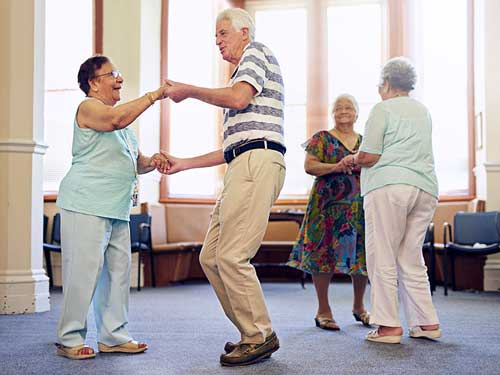




Older adults have a wealth of knowledge and life experience that they can share with younger generations. In certain cultures, this wisdom is prized, however in western culture, it does not hold the same value.
Many older adults may show an interest in continuing their education as they have more free time following retirement. This could be through e-learning a new language or developing a new skill. Research has found that by keeping the brain active, the chances of developing dementia may be slightly reduced.
Mae gan oedolion hŷn gyfoeth o wybodaeth a phrofiad bywyd y gallan nhw eu rhannu â chenedlaethau ifancach. Mewn rhai diwylliannau penodol, caiff y doethineb hwn ei werthfawrogi, ond fel rhan o ddiwylliant y gorllewin, ni chaiff ei werthfawrogi cymaint.
Mae llawer o oedolion hŷn yn awyddus i barhau â'u haddysg gan fod mwy o amser ganddyn nhw ar ôl ymddeol. Gallai hyn fod drwy e-ddysgu iaith newydd neu feithrin sgil newydd. Mae gwaith ymchwil wedi dangos y gallai cadw'r ymennydd yn weithgar olygu y bydd rhywun yn llai tebygol o ddatblygu dementia.

Memory loss is not an inevitable part of the ageing process. The brain is capable of producing new brain cells at any age, so significant memory loss is not an inevitable result of ageing. But just as it is with muscle strength, it has to be used and stimulated. Lifestyle, habits and daily activities have a huge impact on the health of the brain.
There are other reasons why memory loss affects some people and not others, this can be inherited genes, or someone might have been exposed to poisons. Smoking, alcohol and drugs can also impact on memory decline.
While some specific abilities do decline with age, overall memory remains strong for most people throughout their 70s. In fact, research shows that the average 70-year-old performs as well on certain cognitive tests as do many 20-year-olds, and many people in their 60s and 70s score significantly better in verbal intelligence than younger people.
Studies have also shown that many of the memory problems experienced by older people can be lessened or even reversed. Physical exercise and mental stimulation can really improve mental function. Stimulating the brain can stop cells from shrinking and can even increase brain size in some cases.
https://science.howstuffworks.com/life/inside-the-mind/human-brain/human-memory4.htm
Nid yw colli'r cof yn rhan anochel o'r broses heneiddio. Gall yr ymennydd gynhyrchu celloedd newydd ar unrhyw adeg, felly nid yw colli'r cof yn sylweddol yn rhan anochel o heneiddio. Ond yn yr un modd â chryfder y cyhyrau, rhaid ei ddefnyddio a'i ysgogi. Mae ffordd o fyw, arferion a gweithgareddau dyddiol yn cael effaith eithriadol ar iechyd yr ymennydd.
Mae rhesymau eraill pam bod colli'r cof yn effeithio ar rai ond nid eraill, gan gynnwys genynnau a etifeddwyd, neu gallai rywun fod wedi dod i gysylltiad â gwenwynau. Gall ysmygu, alcohol a chyffuriau hefyd effeithio ar ddirywiad y cof.
Er bod rhai galluoedd penodol yn dirywio wrth heneiddio, mae'r cof cyffredinol yn parhau'n gadarn i'r rhan fwyaf o bobl drwy gydol eu 70au. Yn wir, dengys gwaith ymchwil fod unigolyn 70 oed cyffredin yn perfformio llawn cystal ar rai profion gwybyddol â llawer o unigolion 20 oed, ac mae llawer o bobl yn eu 60au a'u 70au yn sgorio'n sylweddol uwch mewn profion deallusrwydd llafar na phobl ifancach.
Mae astudiaethau hefyd wedi dangos y gellir lleihau llawer o'r problemau y bydd pobl hŷn yn eu profi â'r cof, neu hyd yn oed eu gwrthdroi. Gall ymarfer corff ac ysgogi'r meddwl wella gweithrediad meddyliol yn sylweddol. Gall ysgogi'r ymennydd atal y celloedd rhag crebachu a gall hyd yn oed gynyddu maint yr ymennydd mewn rhai achosion.
https://science.howstuffworks.com/life/inside-the-mind/human-brain/human-memory4.htm

Mild memory loss can be frustrating for the individual and can cause feelings of anger, but it would not affect the individual’s quality of life. If memory loss is more severe it can have a devastating impact not only on the individual but also on their family and friends. Individuals can become scared and confused when they don’t recognise people or places and the individual may display anger or anguish in such situations.
They may be unable to live independently for safety reasons, such as forgetting to turn the gas off etc. Accepting help at home or having to move into a care home can lead to loss of self-esteem and can impact on the individual’s ability to do things for themselves.
Gall achos ysgafn o golli'r cof fod yn rhwystredig i'r unigolyn a gall achosi teimladau o ddicter, ond ni fyddai'n effeithio ar ansawdd bywyd yr unigolyn. Os bydd yr achos yn fwy difrifol, gall gael effaith ddinistriol nid yn unig ar yr unigolyn ond hefyd ar ei deulu a'i ffrindiau. Gall unigolion deimlo'n ofnus ac yn ddryslyd pan na fyddan nhw'n adnabod pobl neu leoedd a gall yr unigolyn ddangos dicter neu bryder mewn sefyllfaoedd o'r fath.
Mae'n bosibl na fyddan nhw'n gallu byw'n annibynnol am resymau diogelwch, fel anghofio diffodd y nwy ac ati. Gall derbyn help yn y cartref neu orfod symud i gartref gofal arwain at golli hunan-barch a gall effeithio ar allu'r unigolyn i wneud pethau drosto'i hun.
Beryl is the new manager of an elderly care home. She wants to improve the activities in the afternoon for the residents there in order to stimulate their brains, encourage socialisation and improve the self-esteem of the residents. She calls a meeting with the care workers to discuss this and get some ideas for activities they may be able to introduce.
What activities could be suggested in this meeting?
Beryl yw rheolwr newydd cartref gofal i'r henoed. Mae'n awyddus i wella'r gweithgareddau yn ystod y prynhawn i'r preswylwyr er mwyn ysgogi eu hymennydd, eu hannog i gymdeithasu a gwella eu hunan-barch. Mae'n trefnu cyfarfod â'r gweithwyr gofal er mwyn trafod hyn a chael syniadau am weithgareddau y gallen nhw eu cyflwyno o bosibl.
Pa weithgareddau y gellid eu hawgrymu yn y cyfarfod hwn?